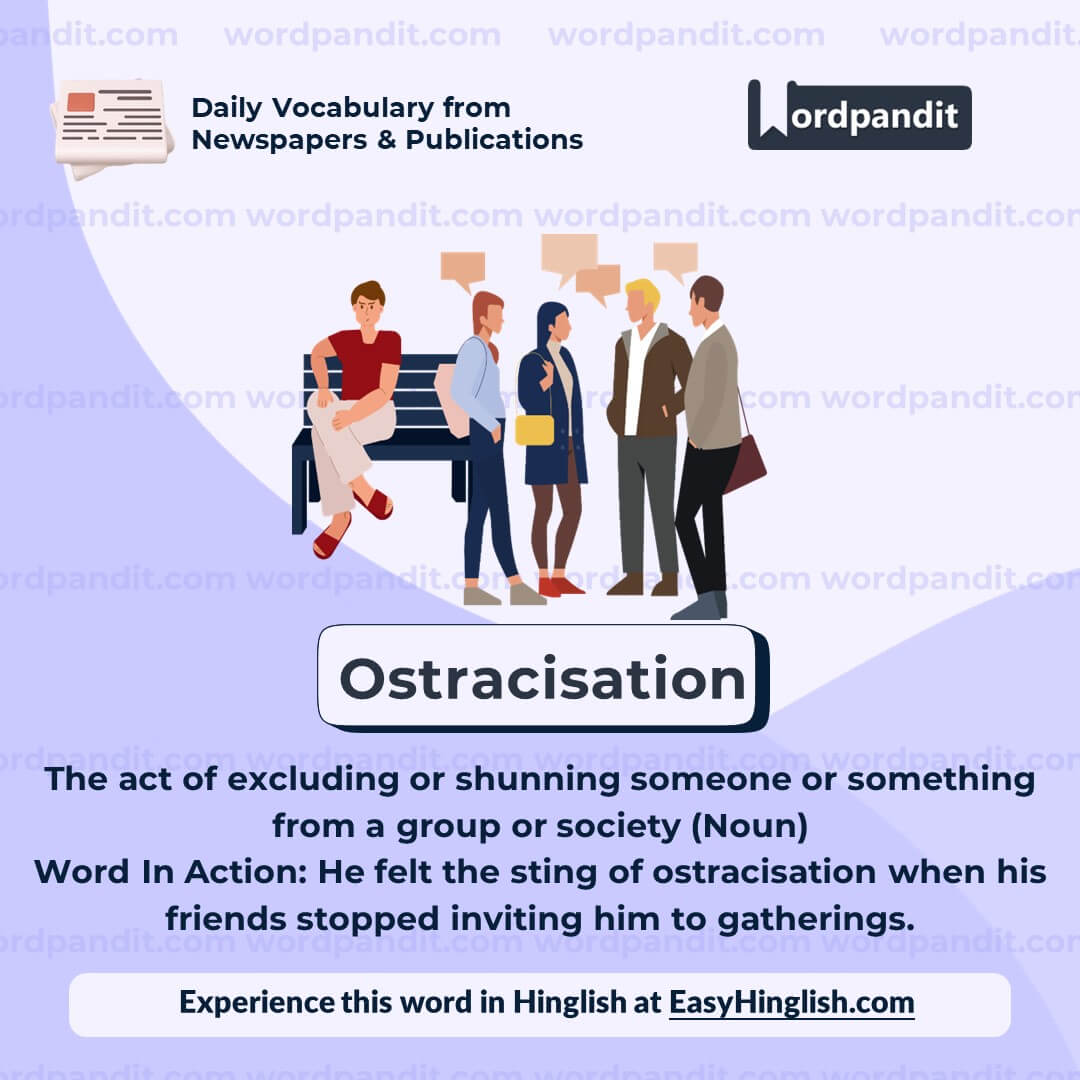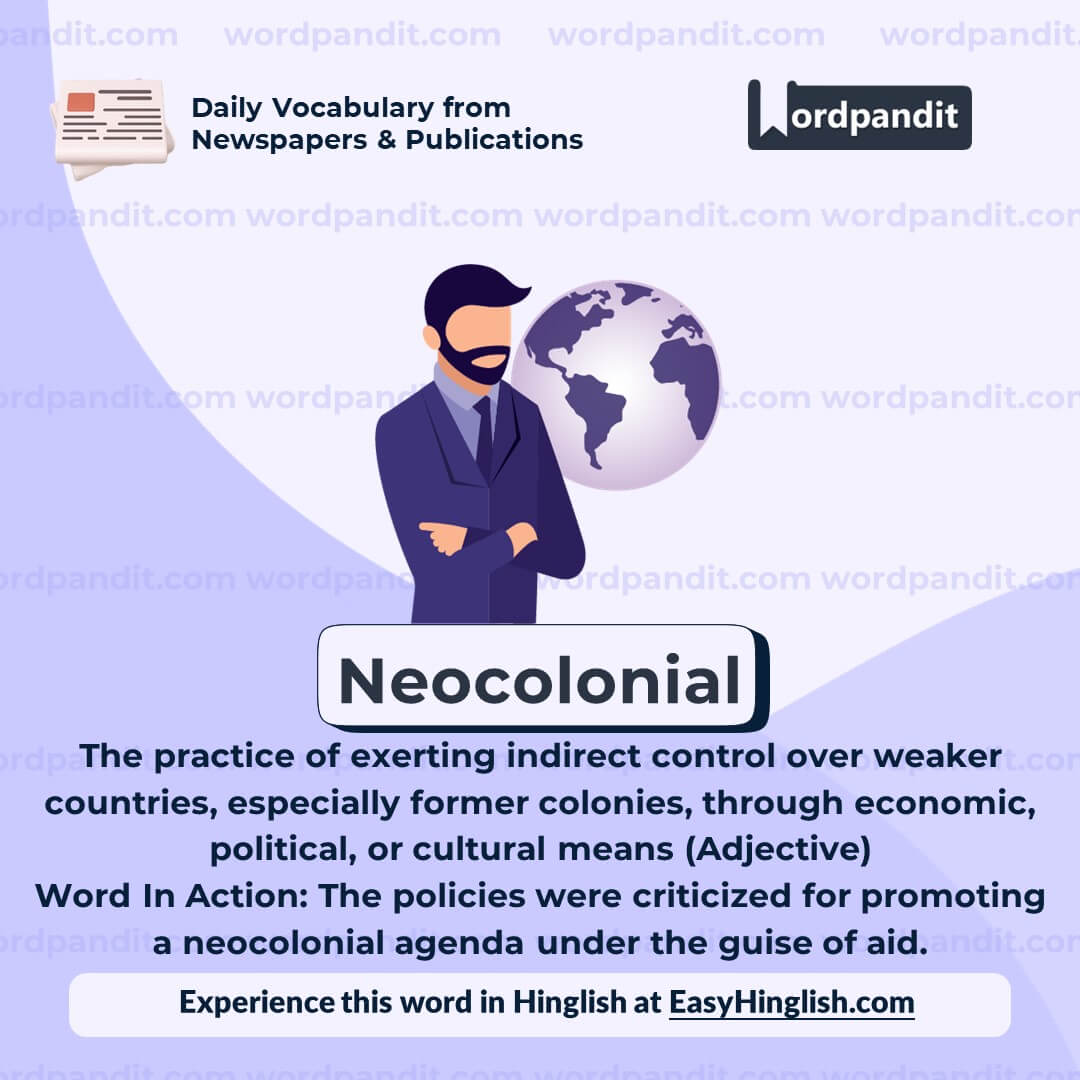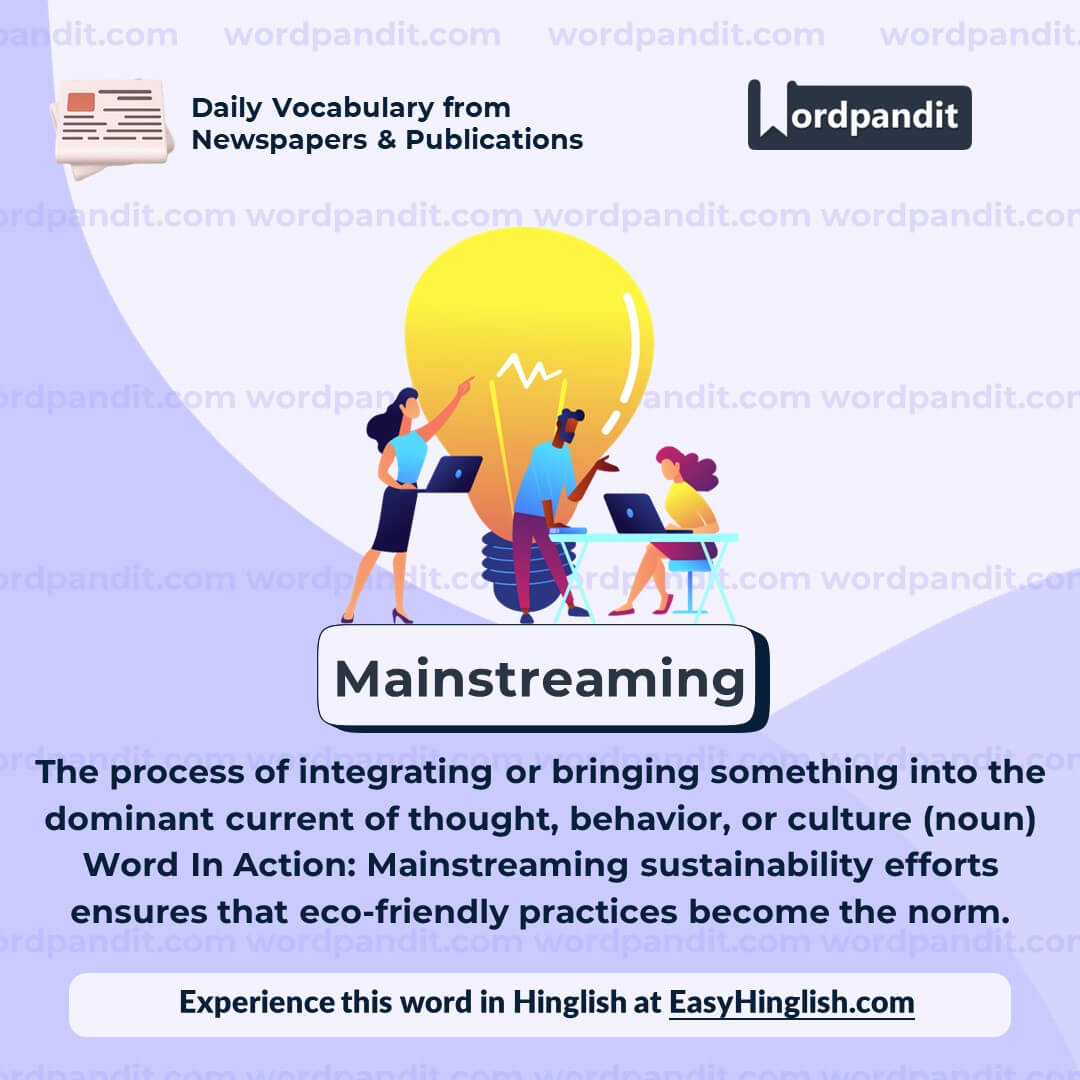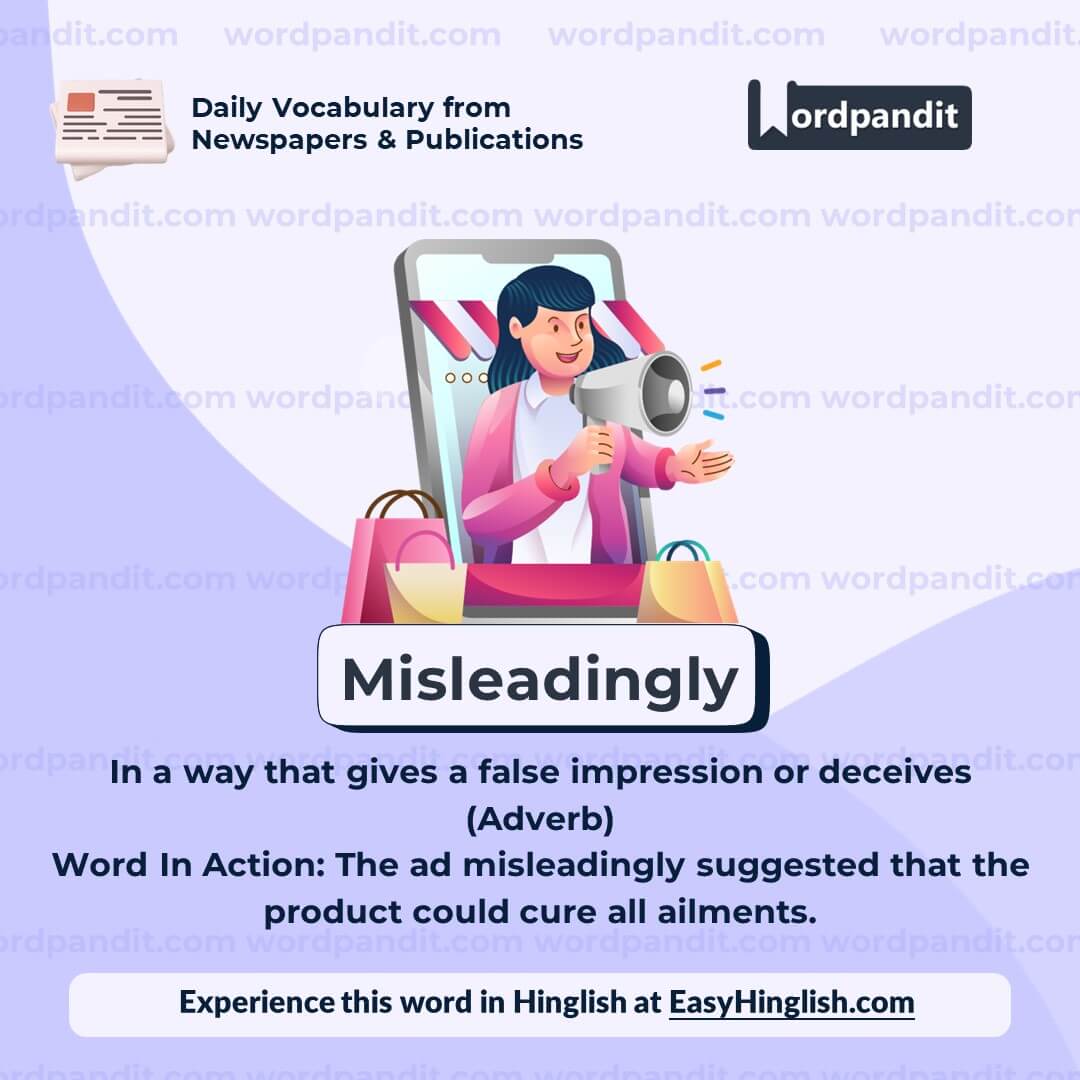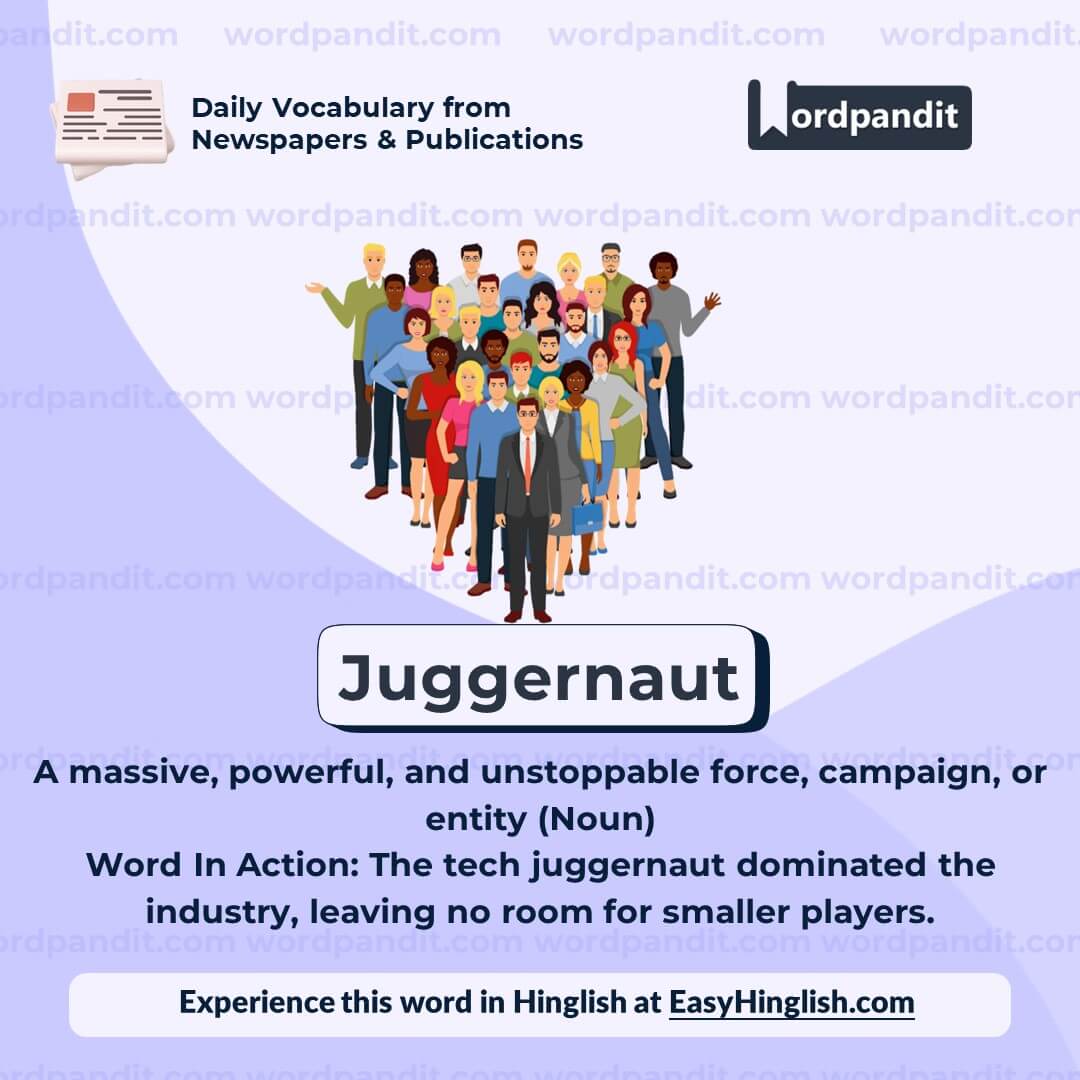Daily Vocabulary from Indian Newspapers and Publications
Welcome to Wordpandit’s Indian Vocabulary Hub
At Wordpandit, we understand the importance of staying rooted in the local context while expanding your language skills. This section focuses on enriching your vocabulary with words and phrases drawn from India’s leading newspapers and publications, ensuring you're learning vocabulary that is practical, relevant, and uniquely Indian.
Why Indian Sources Matter
We believe that the best way to master any language is by immersing yourself in local content. That’s why we carefully curate vocabulary from top Indian publications, including:
- The Hindu
- The Times of India
- The Economic Times
- Hindustan Times
- Live Mint
- The Indian Express
- And many others...
Stay Updated, Stay Relevant
With daily updates from Indian news sources, you’ll be consistently learning words that reflect the trends and shifts in Indian society and culture. Our focus is to provide vocabulary that enhances your understanding of the language in an Indian context.
How Wordpandit Supports Your Goals
Whether you’re preparing for exams, aiming to improve your professional communication, or simply want to stay connected with the latest Indian vocabulary, Wordpandit is here to guide you every step of the way.
Learn with a Practical Approach
Our interactive learning methodology includes real-world examples, engaging activities, and context-specific usage to ensure that every word becomes part of your active vocabulary.
Dive into Indian Vocabulary Today!
Why Choose Wordpandit?
Practical Learning: Focus on words you'll actually encounter in real-world reading, enhancing your comprehension and communication skills.
Diverse Content: From current affairs to scientific breakthroughs, our varied sources expose you to vocabulary across multiple domains.
Effortless Integration: Make Wordpandit a part of your daily routine. Just a few minutes each day can significantly boost your lexicon over time.
Your Path to Vocabulary Mastery
- Visit our Daily Vocabulary section regularly
- Explore new words and their usage in context
- Practice incorporating these words into your own writing and speech
- Track your progress as your vocabulary expands
Start Your Journey Today
Embark on your vocabulary enhancement journey with Wordpandit. By consistently engaging with our daily posts, you'll build a robust vocabulary that serves you well in academic, professional, and personal contexts.
Remember, a word a day keeps linguistic limitations at bay. Make Wordpandit your daily companion in the quest for vocabulary excellence!
WORD-1: Ostracisation
Context:
"Through such statements, the FN organised its ostracisation to reinforce its status as a spokesperson for excluded opinions." - The Wire
Explanatory Paragraph:
The term "ostracisation" refers to the deliberate exclusion of an individual, group, or idea from a society, organization, or community. It is often used to describe instances where someone or something is rejected or shunned due to differing views, behaviors, or beliefs, making them an outsider to the mainstream. The word frequently conveys a negative social connotation, highlighting the act of isolating someone as a form of punishment or disapproval.
Meaning: The act of excluding or shunning someone or something from a group or society (Noun).
Pronunciation: os-tra-si-ZAY-shun
Difficulty Level: ⭐⭐⭐ Intermediate
Etymology: Derived from the Greek word "ostrakizein," meaning "to banish by voting with potsherds," which originally referred to the practice of ostracism in ancient Athens.
Synonyms & Antonyms:
Synonyms: Exclusion, banishment, alienation, marginalization
Antonyms: Inclusion, acceptance, integration, embrace
Usage Examples:
- The whistleblower faced ostracisation from her colleagues after revealing unethical practices in the organization.
- In many societies, ostracisation is a powerful tool to enforce conformity to cultural norms.
- The writer explored themes of ostracisation in her novel about a small-town outcast.
- Public figures often endure ostracisation when they express controversial opinions that challenge societal norms.
Cultural Reference:
"The term 'ostracisation' stems from the ancient Greek practice of ostracism, where citizens would vote to exile a person from Athens for ten years, often to prevent the rise of potential tyrants." - Historical Accounts
Think About It:
Can the act of ostracisation ever be justified in modern society, or does it always lead to more harm than good?
Quick Activity:
Write a short paragraph describing a fictional scenario where someone experiences ostracisation. How does it affect their emotions and behavior?
Memory Tip:
Think of "ostracisation" as isolating someone like an "oyster" from its shell — separating it from its community. This imagery can help you recall the meaning of the word.
Real-World Application:
Ostracisation is often observed in social settings, such as schools or workplaces, where individuals may be excluded due to differences in opinions, appearance, or behavior. Recognizing this phenomenon can help promote inclusion and prevent social isolation.
WORD-2: Neocolonial
Context:
"Worse still, India is also widely perceived as a neocolonial power, more interested in exploiting Bangladesh than in promoting its people’s welfare." - The Wire
Explanatory Paragraph:
The word "neocolonial" refers to the use of economic, political, or cultural pressures by powerful nations to influence or control less powerful nations, especially former colonies. Unlike classical colonialism, which involved direct territorial control, neocolonialism operates through indirect mechanisms such as trade policies, foreign aid, or economic dependency. It is often criticized for perpetuating inequality and exploiting weaker nations under the guise of partnership or development.
Meaning: The practice of exerting indirect control over weaker countries, especially former colonies, through economic, political, or cultural means (Adjective).
Pronunciation: nee-oh-koh-LOH-nee-uhl
Difficulty Level: ⭐⭐⭐⭐ Advanced
Etymology: The term combines "neo-" (from the Greek word for "new") with "colonial," referring to practices reminiscent of colonialism but in a modern context. It emerged in the mid-20th century during decolonization.
Synonyms & Antonyms:
Synonyms: Economic imperialism, indirect colonialism, modern colonialism, exploitation
Antonyms: Decolonization, sovereignty, independence, liberation
Usage Examples:
- The nation's trade policies were criticized as neocolonial, benefitting only the powerful corporations from developed countries.
- Many activists argue that foreign aid with strings attached is a tool of neocolonial control.
- The book examines how cultural exports like media and fashion can act as instruments of neocolonial influence.
- Developing nations are increasingly rejecting neocolonial policies imposed by international financial institutions.
Cultural Reference:
"Neocolonialism was a term popularized by Kwame Nkrumah, the first Prime Minister of Ghana, to describe the new forms of domination and exploitation faced by African nations after gaining independence." - Historical Texts
Think About It:
Is neocolonialism more harmful than traditional colonialism because it is less visible and harder to challenge?
Quick Activity:
Identify one real-world example of neocolonialism in action (e.g., trade, loans, or cultural exports) and explain how it affects the weaker nation involved.
Memory Tip:
Remember "neocolonial" by breaking it into "neo" (new) and "colonial" (like colonialism). Think of it as "new-age colonialism" without direct rule but similar exploitation.
Real-World Application:
The concept of neocolonialism is frequently used in international relations, particularly in discussions about global trade, foreign aid, and cultural imperialism. It helps us critically analyze the inequalities embedded in modern globalization and economic agreements.
WORD-3: Mainstreaming
Context:
"Despite adversity, the FN turned the tide, seizing the opportunity of departing factions to label them as racist and extreme, thus initiating a process of normalisation or mainstreaming of the party." - The Wire
Explanatory Paragraph:
The term "mainstreaming" refers to the process of bringing something into the dominant or widely accepted norms, practices, or opinions of a society or group. In this case, it involves making an idea, practice, or entity more socially acceptable or part of the mainstream. For example, when controversial or marginalized movements work to gain acceptance by moderating their rhetoric or aligning with broader societal values, they are undergoing "mainstreaming."
Meaning: The process of integrating or bringing something into the dominant current of thought, behavior, or culture (noun).
Pronunciation: main-streem-ing
Difficulty Level: ⭐⭐⭐ Intermediate
Etymology: Derived from the combination of "mainstream," meaning the dominant trend, and the suffix "-ing," indicating a process or action. First used in the 20th century to describe the inclusion of marginalized groups or ideas into prevailing norms.
Synonyms & Antonyms:
Synonyms: Normalization, integration, assimilation, inclusion
Antonyms: Marginalization, exclusion, segregation, alienation
Usage Examples:
- The political party's shift toward moderate policies was part of its effort at mainstreaming to attract a larger voter base.
- Advocates have called for the mainstreaming of mental health discussions to combat stigma.
- The mainstreaming of renewable energy technologies has significantly changed global energy policies.
- Efforts at mainstreaming gender equality have led to notable policy changes in many organizations.
Cultural Reference:
"Mainstreaming" is often discussed in the context of politics, such as when far-right or leftist parties attempt to shed their radical image and move toward centrist policies to appeal to a broader electorate. For example, political analysts have examined the mainstreaming of environmentalism, which has transformed from a fringe movement to a global priority. - General Observation
Think About It:
Can the process of mainstreaming be ethically problematic when it involves normalizing controversial or harmful ideologies? How can societies draw the line between integration and compromise of core values?
Quick Activity:
Identify three examples of ideas, practices, or movements that have undergone mainstreaming in the past decade. Reflect on how this process has influenced their acceptance or perception.
Memory Tip:
To remember "mainstreaming," think of a stream flowing into a large river—smaller or separate streams join the larger mainstream, becoming part of the dominant flow.
Real-World Application:
"Mainstreaming" is a key concept in fields like education (e.g., integrating students with disabilities into regular classrooms), media (e.g., normalizing diverse representation), and politics (e.g., adapting radical ideologies to appeal to a broader audience). It helps individuals and organizations understand how societal norms evolve.
WORD-4: Misleadingly
Context:
"The misleadingly named ‘Baku Climate Unity Pact’ promised unity but left the nations more divided than ever." - The Wire
Explanatory Paragraph:
The adverb "misleadingly" is used to describe actions, statements, or appearances that are deceptive or give a false impression. It often implies that something is intentionally or unintentionally presented in a way that leads others to believe something untrue or different from reality. This word is commonly used in contexts where there is a discrepancy between appearance and truth, or intention and outcome.
Meaning: In a way that gives a false impression or deceives (Adverb).
Pronunciation: mis-LEED-ing-lee
Difficulty Level: ⭐⭐ Beginner
Etymology: Derived from the verb "mislead," which comes from the Old English "mislaed," meaning "to lead astray," combined with the suffix "-ly" to form the adverb.
Synonyms & Antonyms:
Synonyms: Deceptively, falsely, dishonestly, fraudulently
Antonyms: Truthfully, accurately, honestly, transparently
Usage Examples:
- The advertisement misleadingly claimed that the product was 100% natural when it contained artificial ingredients.
- The map was drawn misleadingly, exaggerating the size of certain regions.
- Her friendly tone was misleadingly comforting, hiding her real intentions.
- The report misleadingly suggested that the project was a success, despite numerous issues.
Cultural Reference:
"Many movies and books have titles that misleadingly suggest one type of story, only to surprise audiences with unexpected themes. For instance, 'The NeverEnding Story' is not literally never-ending." - Pop Culture Discussions
Think About It:
Why do you think people or organizations often present things misleadingly? Is it always intentional, or can it be accidental?
Quick Activity:
Write a short sentence that uses the word "misleadingly" to describe an everyday situation (e.g., an advertisement, a sign, or a conversation).
Memory Tip:
Break "misleadingly" into "mis-" (wrong) and "leading" (guiding). Imagine someone guiding you down the wrong path — that’s the essence of "misleadingly."
Real-World Application:
The word "misleadingly" is widely used in consumer protection, politics, and media criticism to call out false or deceptive representations. Learning to identify misleading information can help you make informed decisions and avoid being deceived.
WORD-5: Juggernaut
Context:
"Bengal chief minister Mamata Banerjee has made a disruptive intervention in oppositional politics by offering to lead INDIA (Indian National Developmental Inclusive Alliance) ostensibly to make up for Congress’s deficient leadership against the Narendra Modi juggernaut." - The Wire
Explanatory Paragraph:
The word "juggernaut" refers to a powerful, unstoppable force or entity that crushes everything in its path. Originally associated with a religious procession in India, the term has evolved to describe anything—such as a movement, institution, or leader—that is overwhelmingly dominant and difficult to resist. It is often used metaphorically in politics, business, and sports to convey the idea of overwhelming strength or momentum.
Meaning: A massive, powerful, and unstoppable force, campaign, or entity (Noun).
Pronunciation: JUH-ger-nawt
Difficulty Level: ⭐⭐⭐ Intermediate
Etymology: Derived from the Sanskrit word "Jagannatha," meaning "Lord of the World," referring to Lord Jagannath of Puri. During religious processions in India, massive chariots were used, and these came to symbolize overwhelming, unstoppable power in English usage.
Synonyms & Antonyms:
Synonyms: Behemoth, colossus, powerhouse, steamroller, force
Antonyms: Weakling, underdog, minor force, frailty
Usage Examples:
- The tech juggernaut continued to dominate the global market with its innovative products.
- The political juggernaut crushed all opposition in the recent elections.
- The team proved to be a juggernaut, winning every game of the season by a wide margin.
- Social media has become a cultural juggernaut, shaping how people communicate and interact globally.
Cultural Reference:
"The term 'juggernaut' originates from the massive chariots used during the annual Rath Yatra festival in Puri, Odisha, where they symbolized unstoppable devotion and power. British colonial observers adapted this concept into English to describe any overwhelming force." - Historical Linguistics
Think About It:
Do you think juggernauts in politics or business are always beneficial, or can their dominance stifle competition and innovation?
Quick Activity:
Think of a company, political figure, or sports team you consider a juggernaut. Write a sentence explaining why they are considered unstoppable.
Memory Tip:
Connect "juggernaut" with the massive chariots of Lord Jagannath that roll forward with unstoppable momentum during the Rath Yatra. Picture something equally massive and unstoppable in your life to remember this word!
Real-World Application:
The term "juggernaut" is widely used in media and conversations to describe anything dominant or unstoppable, from political movements and market leaders to cultural phenomena. Understanding this word helps in analyzing power dynamics and trends in various fields.


